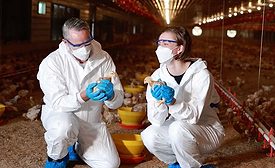Food Type
Balancing Chemical and Biological Hazards With the Help of APAs to Safeguard Food Quality
Antimicrobial processing aids are preventive control interventions that are capable of reducing bacteria from the surfaces of foods at multiple steps throughout the supply chain
July 2, 2024
Outbreaks of Foodborne Illnesses and Recalls Associated With Ice Cream and Frozen Dessert Products
Reports in the literature indicate that ice cream has been associated with illnesses linked to numerous pathogens, including Listeria, which can cause severe illness
Brett Weed M.P.H., M.S.
Karunya Manikonda M.P.H.
Allison Wellman M.P.H.
Greg Gharst Ph.D.
Matthew Doyle D.V.M., M.P.H.
Amanda Conrad M.P.H.
Alexandra Palacios M.P.H.
Melanie LaGrossa M.P.H.
Stelios Viazis Ph.D.
July 1, 2024
Never miss the latest news and trends driving the food safety industry
eNewsletter | Website | eMagazine
JOIN TODAY!Copyright ©2025. All Rights Reserved BNP Media.
Design, CMS, Hosting & Web Development :: ePublishing












